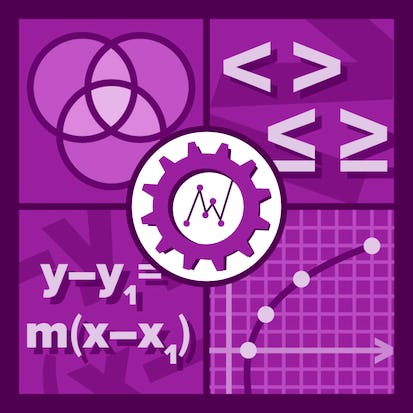- Level Foundation
- Duration 13 hours
- Course by Duke University
-
Offered by

About
Data science courses contain math—no avoiding that! This course is designed to teach learners the basic math you will need in order to be successful in almost any data science math course and was created for learners who have basic math skills but may not have taken algebra or pre-calculus. Data Science Math Skills introduces the core math that data science is built upon, with no extra complexity, introducing unfamiliar ideas and math symbols one-at-a-time. Learners who complete this course will master the vocabulary, notation, concepts, and algebra rules that all data scientists must know before moving on to more advanced material. Topics include: ~Set theory, including Venn diagrams ~Properties of the real number line ~Interval notation and algebra with inequalities ~Uses for summation and Sigma notation ~Math on the Cartesian (x,y) plane, slope and distance formulas ~Graphing and describing functions and their inverses on the x-y plane, ~The concept of instantaneous rate of change and tangent lines to a curve ~Exponents, logarithms, and the natural log function. ~Probability theory, including Bayes’ theorem. While this course is intended as a general introduction to the math skills needed for data science, it can be considered a prerequisite for learners interested in the course, "Mastering Data Analysis in Excel," which is part of the Excel to MySQL Data Science Specialization. Learners who master Data Science Math Skills will be fully prepared for success with the more advanced math concepts introduced in "Mastering Data Analysis in Excel." Good luck and we hope you enjoy the course!Modules
About the Course
1
Videos
- Welcome to Data Science Math Skills
2
Readings
- Course Information
- Weekly feedback surveys
Sets and What They're Good For
1
Assignment
- Practice quiz on Sets
3
Videos
- Sets - Basics and Vocabulary
- Sets - Medical Testing Example
- Sets - Venn Diagrams
1
Readings
- A note about the video lectures in this lesson
The infinite World of Real Numbers
1
Assignment
- Practice quiz on the Number Line, including Inequalities
4
Videos
- Numbers - The Real Number Line
- Numbers - Less-than and Greater-than
- Numbers - Algebra With Inequalities
- Numbers - Intervals and Interval Notation
1
Readings
- A note about the video lectures in this lesson
That Jagged S Symbol
2
Assignment
- Practice quiz on Simplification Rules and Sigma Notation
- Graded quiz on Sets, Number Line, Inequalities, Simplification, and Sigma Notation
3
Videos
- Sigma Notation - Introduction to Summation
- Sigma Notation - Simplification Rules
- Sigma Notation - Mean and Variance
2
Readings
- A note about the video lectures in this lesson
- Feedback
Descartes Was Really Smart
1
Assignment
- Practice quiz on the Cartesian Plane
4
Videos
- Cartesian Plane - Plotting Points
- Cartesian Plane - Distance Formula
- Cartesian Plane - Point-Slope Formula for Lines
- Cartesian Plane: Slope-Intercept Formula for Lines
1
Readings
- A note about the video lectures in this lesson
Input-Output Machines
2
Assignment
- Practice quiz on Types of Functions
- Graded quiz on Cartesian Plane and Types of Function
4
Videos
- Functions - Mapping from Sets to Sets
- Functions - Graphing in the Cartesian Plane
- Functions - Increasing and Decreasing Functions
- Functions - Composition and Inverse
2
Readings
- A note about the video lectures in this lesson
- Feedback
This is about that derivative stuff
1
Assignment
- Practice quiz onTangent Lines to Functions
2
Videos
- Tangent Lines - Slope of a Graph at a Point
- Tangent Lines - The Derivative Function
1
Readings
- A note about the video lectures in this lesson
Fast Growth, Slow Growth
2
Assignment
- Practice quiz on Exponents and Logarithms
- Graded quiz on Tangent Lines to Functions, Exponents and Logarithms
5
Videos
- Using Integer Exponents
- Simplification Rules for Algebra using Exponents
- How Logarithms and Exponents are Related
- The Change of Base Formula
- The Rate of Growth of Continuous Processes
2
Readings
- A note about the video lectures in this lesson
- Feedback
Basic Probability Definitions
1
Assignment
- Practice quiz on Probability Concepts
2
Videos
- Probability Definitions and Notation
- Joint Probabilities
1
Readings
- A note about the video lectures in this lesson
Problem Solving Methods
1
Assignment
- Practice quiz on Problem Solving
3
Videos
- Permutations and Combinations
- Using Factorial and “M choose N”
- The Sum Rule, Conditional Probability, and the Product Rule
1
Readings
- A note about the video lectures in this lesson
Applying Bayes Theorem and the Binomial Theorem
2
Assignment
- Practice quiz on Bayes Theorem and the Binomial Theorem
- Probability (basic and Intermediate) Graded Quiz
3
Videos
- Bayes’ Theorem (Part 1)
- Bayes’ Theorem (Part 2)
- The Binomial Theorem and Bayes Theorem
2
Readings
- A note about the video lectures in this lesson
- Feedback
Auto Summary
"Data Science Math Skills," offered by Coursera, is a foundational course designed to equip learners with essential math skills for success in data science. Targeting individuals with basic math knowledge, it covers core topics such as set theory, real number properties, interval notation, Cartesian plane math, functions, rates of change, exponents, logarithms, and probability theory. This 780-minute course is ideal for those preparing for advanced studies like "Mastering Data Analysis in Excel." Available with a Starter subscription, it ensures learners gain the necessary vocabulary, notation, and algebra rules pivotal for data science.

Daniel Egger

Paul Bendich


